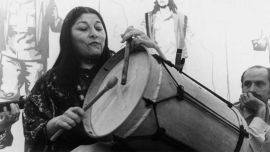Renowned Argentine filmmaker and politician Fernando ‘Pino’ Solanas has died in Paris at the age of 84, just days after being admitted to a hospital with the novel coronavirus, the Foreign Ministry confirmed Saturday.
Solanas, who was currently serving as Argentina’s ambassador to the United Nations Educational, Scientific and Cultural Organisation (UNESCO), announced last month that he and his wife, Angela Correa, had contracted Covid-19, posting an image of him in a hospital bed.
Tributes to the late artist, lawmaker and senator began to flood in on Saturday morning, following confirmation of his passing.
"Huge grief for Pino Solanas. He died while fulfilling his duties as Argentina's ambassador to UNESCO," the Foreign Ministry said in a statement issued on Twitter. "He will be remembered for his art, his political commitment and for his ethics, always at the service of a better country.”
Nevertheless, the news came as something of a shock. Five days ago – in his last post on social networks – the award-winning director had described his condition as “delicate,” though he said he was “resisting” Covid-19.
A committed, revolutionary and heavily prolific filmmaker, Solanas was a passionate and persevering politician committed to social change. He also was a strong advocate for environmental change, calling on humanity to take care of nature.
Loquacious, sharp and famed for his passionate, fiery speeches, he served as a senator and deputy representing Buenos Aires City and even ran as a presidential candidate in 2007, uniting his Proyecto Sur party with the Partido Socialista Auténtico to finish fifth with under two percent of the national vote.
In June 2019, he announced that he was joining the Frente de Todos coalition and endorsed the presidential ticket led by Alberto Fernández, now Argentina’s president.
Toward a Third Cinema
Born on February 16, 1936 in the capital, Solanas made his film début in 1962, with the short film Seguir andando, but it was the 1967 three-part documentary La Hora de los Hornos, co-directed with Octavio Getino and lasting more than four hours, which truly made waves. The film today is recognised as an example of politically committed national cinema and resistance to authoritarianism and dictatorship.
The film, which was not formally released in Argentina until 1973 due to censorship, had to be seen in hiding, though Solanas won several awards in European nations for the feature.
The creator of more than 20 films, Solanas also gained fame for his 1971 feature interview with Juan Domingo Perón, released as Perón: actualización política y doctrinaria para la toma del poder (“Perón: Political and doctrinal update for the seizure of power”).
Other notable works include his 2004 documentary Memoria del saqueo, a fim that explored Argentina's precarious social and economic circumstances and traces more than 25 years of history. Presented at the Berlin Film Festival in 2004, Solanas was honoured at the event with a prestigious Golden Bear, in recognition of his career.
Perhaps Solanas’ most honoured and most praised works, however, are 1985’s El exilio de Gardel (Tangos) and the 1988 feature Sur, for which he was won the Best Director prize at the Cannes film festival.
The director’s impact, however, goes beyond what ended up on the screen. Along with Getino, Solanas was one of the original authors of the ‘Hacia un tercer cine’ (“Toward a Third Cinema”) manifesto, which in the 1960s called for a new type of Latin American cinema that opposed the dominant, commercial cinema of Hollywood and the United States.
"The anti-imperialist struggle of the peoples of the Third World, and of their equivalents within the metropolises, today constitutes today the axis of the world revolution,” the film duo wrote in their now-legendary text.
“Third cinema is, in our opinion, the cinema that recognises in that struggle the most gigantic cultural, scientific, and artistic manifestation of our time, the great possibility of constructing a liberated personality with each people as a starting point – in a word, the decolonisation of culture,” it concluded.
Political fights
Despite his advancing years, Solanas retained the political fire and desire for change that dominated his early years. Just last month, for example, the politicians visited Pope Francis at the Vatican, meeting with the Argentine pontiff to discuss joint efforts to tackle “climate change and the rights of Mother Earth,” as he described it.
For many young Argentines, Solanas was known as a strong advocate for the legalisation of abortion in Argentina, with his 2018 speech calling for reform – delivered as lawmakers debated a bill to reform existing legislation – fresh in the memory.
"Let's put an end to the hypocrisy of a ruling class that, knowing that the wealthiest can access for safe abortions, condemns the less wealthy to infection or death," he said, hailing the tens of thousands of protesters who took to the streets to demand abortion reform.
"Bravo girls, you have lifted the honour and dignity of Argentine women high. If [the bill] does not pass today, next year we will insist [on it]. And if it does not pass next year, we will insist the following year. No-one will be able to stop the wave of the new generation. It will be law,” he declared.
– TIMES/AFP/NA


























Comments